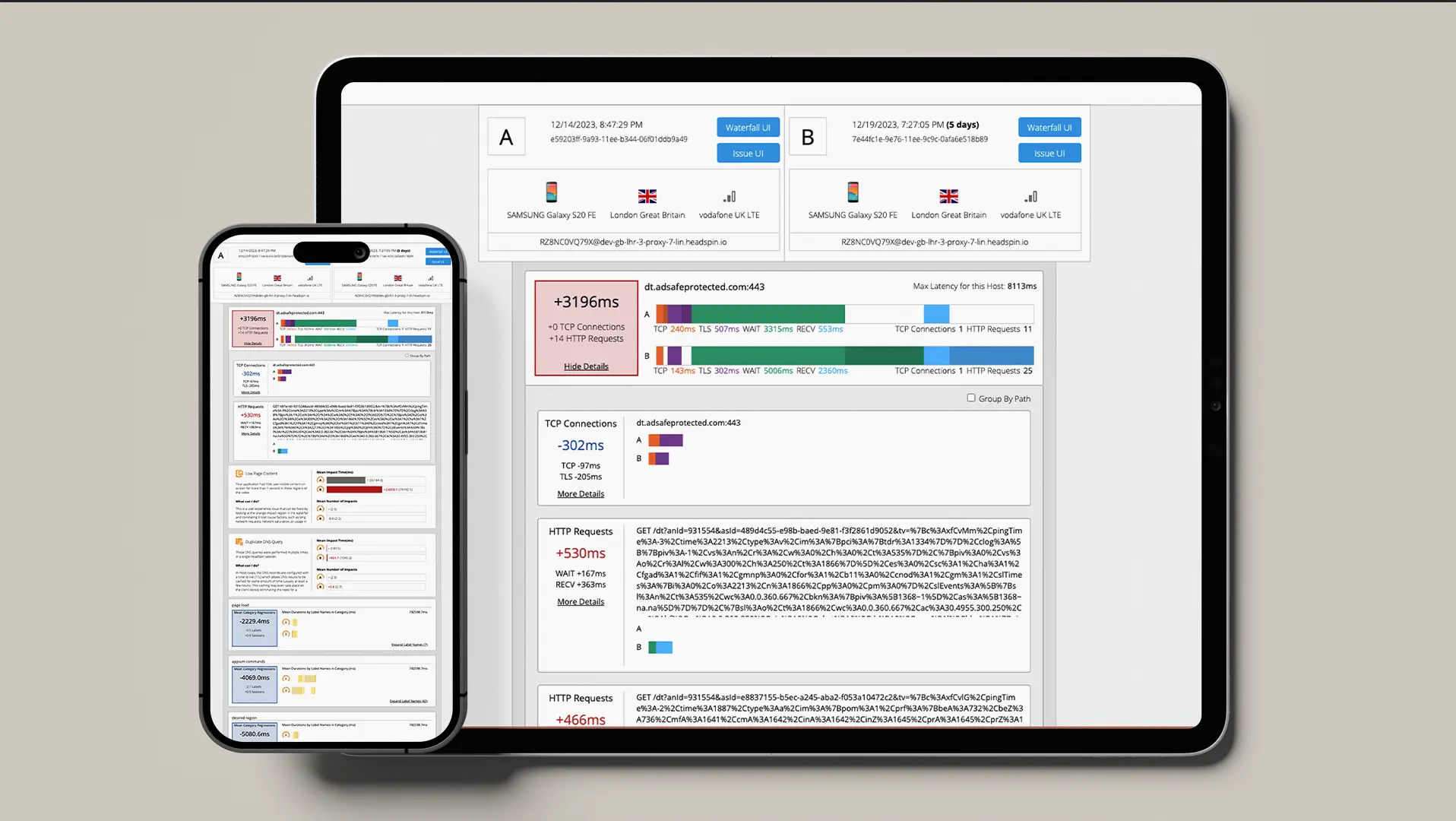AI-Powered Key Takeaways
Appium is a free, open-source test automation framework for native, mobile web, and hybrid applications. Appium mobile testing at HeadSpin automates mobile testing on real devices for analyzing and optimizing app performance under real-world conditions. With our team of highly experienced mobile test automation experts, we provide guidance for organizations, helping them establish their mobile testing strategy.
Our support for Appium test frameworks and API-driven approach ensures that you don’t have to modify any existing test scripts for mobile testing. Just decide what apps to test – Appium supports a wide variety of mobile devices to test on. Most importantly, you can create your own test scenario, from choosing the networks, locations, and types of devices to replicate real-world conditions.
Why Appium for Mobile Testing?
Mobile automation testing is integral to modern enterprises. Most tools that are available for mobile test automation require additional agents that must be compiled with most of the application code to ensure that the tool can communicate with the native mobile application. This is not the case with Appium mobile testing. The following are some of the key differences that keep Appium ahead of other open-source mobile test automation tools available today:
- Appium is a cross-platform mobile application testing tool that uses JSON wire protocol internally for interacting with native applications using Selenium WebDriver.
- It functions as a server and operates in the background like a Selenium server.
- Appium targets tests developed using development tools regardless of the programming languages and with language-specific client libraries and Selenium WebDriver API.
- You can take complete control with full access to databases from test code and back-end APIs.
- It aims to automate any mobile application created in numerous programming languages with different types of frameworks.
Read: Using Appium for Automated Testing of Roku TV Apps
Test on Multiple Platforms
Because it is a cross-platform solution, Appium enables cross-platform mobile testing. This means that you don’t have to set up different tests for different platforms – the same test will work on both iOS and Android. In order to communicate with iOS and Android with Selenium WebDriver, Appium makes use of the JSON wire protocol.
Fast and Reliable
Appium is compatible with most programming languages used in mobile application development. The major programming languages that can be used in conjunction with Appium include JavaScript, Ruby, Java, PHP, Node.js, C#, and Python. So, Appium offers flexibility, reliability, and versatility when it comes to mobile app development and testing.
Also read: Selenium Testing - A Complete Guide
Scale with HeadSpin's Global Device Infrastructure
You can use HeadSpin’s wide range of iOS and Android devices worldwide to run Appium test automation scripts for building better app experiences. Comprehensive data from real-life scenarios enables teams to focus on not just the application, but the customer experience as well.
Use of Standard API
We recommend Appium for setting up mobile testing infrastructure because recompilation of applications or modification of codes is not required. Appium uses a standard API in all the platforms, making it effortless for creating your tests against Android and iOS platforms with the same API. However, because the UI elements vary on both iOS and Android, separate scripts are still required.
Testing Framework of Choice
Appium gives you the flexibility and freedom to use the testing frameworks of your choice. Previously, mobility teams only had two options – write tests through JavaScript with the help of the UI Automation library for Apple or UI Automator for Google. With Appium, you can use any testing framework that suits your needs.
Continuous Integration
One of the most significant benefits of using Appium for mobile testing is that it can also be used directly with Continuous Integration (CI) platforms such as Jenkin and Bamboo. Because Appium is simply a code library which can be imported in any language, it’s easy to make it work in tandem with the CI servers to deliver better results from QA testing. This not only makes the testing process fast but more efficient and productive as well.
Complete Automation
With HeadSpin, you can leverage the automated testing process. Appium allows for complete automation, which accelerates the development process. Most importantly, it will help you receive information and feedback almost instantaneously.
Appium’s structure is guided by the following tenets:
- A mobile automation framework should be open-source, in practice, in spirit, and in name
- A mobile automation framework should not waste a great deal of time or effort in creating something that already exists – automation APIs
- You should not be locked into a particular framework or programming language to create and run your tests
- You should not have to modify your application or recompile it in any manner to automate it
At HeadSpin, we are dedicated to helping mobility teams make the process of mobile app development, testing, and device sharing faster and seamless by integrating our services with state-of-the-art automation tools like Appium. We can help:
- Streamline the entire CI/CD process
- Create robust Appium scripts with ease
- Reduce the complexity of test frameworks
- Support parallel testing on multiple mobile devices
Choosing the right mobile automation testing tool is the key to a successful mobile enterprise. Integrating your mobile app development process with Appium can provide you with many benefits. If you are confused about what suits you the best or are looking for help, get in touch with HeadSpin for expert consulting.
Sign up on HeadSpin and automate your mobile tests using the best open-source testing automation tool for better and faster delivery of applications.
FAQs
1. How can you determine element locators in the native Android application?
There are two ways of determining element locators. The first is the primitive way in which the driver instance is used, and the getPageSource method is called. The getPageSource will deliver a bulk string of XML representing the user interface hierarchy at the point in time we asked for it. Users can then manually inspect the XML document.
The second and much easier way is by using Appium Desktop. Users can examine the UI hierarchy with Appium desktop instead of using the page source command. The Appium Desktop is user-friendly and provides the whole XML output. It also provides a graphical representation of navigating through the app and will even suggest locator strategies and selectors for users.
2. Can an Appium server be initiated programmatically?
It is possible to start an Appium server programmatically. Typically, the commands provided at the command prompt are created in notepad and saved with the.bat extension, and clicking the bat file executes the commands.
3. How can elements be inspected in iOS applications?
You can detect elements within IOS applications using an Appium inspector, a GUI-based tool. These GUI-based tools strongly resemble the selenium IDE.
4. What is the underline API to which Appium adheres?
Appium follows the underlying selenium API to automate test cases. Since Appium includes all selenium APIs, experts suggest that Appium is an extension of selenium.


























.png)

























-1280X720-Final-2.jpg)






